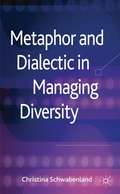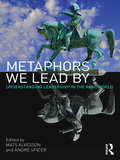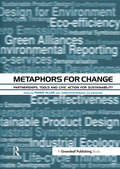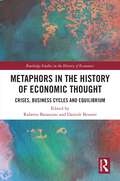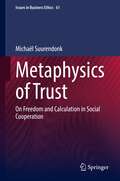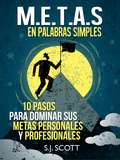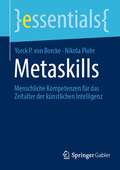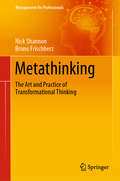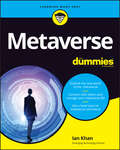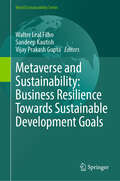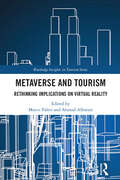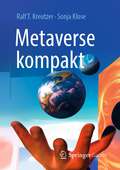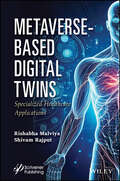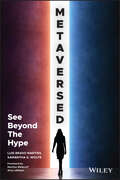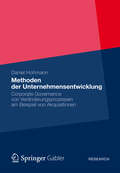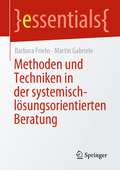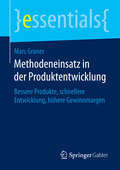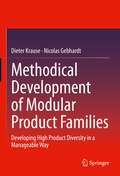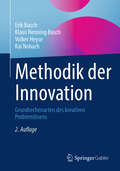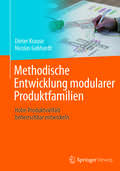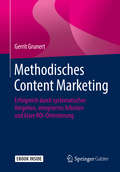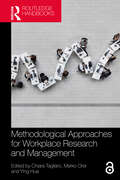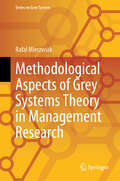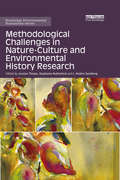- Table View
- List View
Metaphor and Dialectic in Managing Diversity
by Christina SchwabenlandMetaphor and dialectic are modes of thinking that influence the ways in which we identify what we have in common with others, how we differ and how we manage this diversity to achieve organizational goals. This book explores how we can become more aware of these unconscious processes and challenge stereotypes.
Metaphors We Lead By: Understanding Leadership in the Real World
by Mats AlvessonWe live in a leadership-obsessed society. The result is that we assume nearly any social or economic ill can be mended through better leadership. Sometimes, this commitment to leadership is followed by hero worshipping, wishful thinking and misplaced hope. Seeking to understand the faith we place in leadership, the authors draw on a number of in-depth studies of managers trying to "do" leadership. It presents six metaphors for the leader: as gardener, cosy-crafter, saint, cyborg, commander and bully. Some of these offer unexpected insights into how leadership does and does not work. The book sheds light on a varied - often contradictory and sometimes darker - side of leadership. Cutting through the management-speak drenched current literature on leadership, Metaphors We Lead By presents an enlightening and refreshing understanding of an important topic. It will be useful reading for students and researchers, as well as the thinking manager.
Metaphors for Change: Partnerships, Tools and Civic Action for Sustainability
by David Gee Penny Allen Christophe BonazziHow can we get from where we are to where we want to be? Metaphors for Change attempts to answer this question and provide a roadmap for sustainability by bringing together the thoughts of a unique collection of leading change agents from business, government and academia. Environmental questions have previously been dealt with metaphorically, by catastrophism or manicheism (zero growth; Malthusianism, Deep Ecology; "man is the enemy"; less is more). These metaphors have had limited impact because they have failed to connect with the mainstream of cultural, political, and business ideas. This book examines a number of new metaphors – and related partnerships, tools and action – which appear to have greater possibilities for the world in which we now live. The editors argue that Metaphors for Change can deliver to the public and to decision-makers new perceptions ("structured knowledge") that can help interpret the past and the present, and help us forge the future. The wider the gap between the "now" and the "necessary", the stronger the bridging perceptions have to be in order to break through barriers of fear and conservatism. Some of the concepts considered are: sustainable development; the polluter pays principle; the precautionary principle; eco-efficiency; eco-effectiveness; life-cycle assessment; design for the environment; eco-services; dematerialization; industrial symbiosis; industrial ecology; and zero emissions. There are of course other useful metaphors on the horizon, some of them included in this book. Including key contributions from the ground-breaking conferences ECO 97 and ECO 99, along with other specially commissioned and reprinted pieces, Metaphors for Change provides a treasure chest of new ideas, innovations and action. Accessible and forward-thinking, it will prove indispensable both as a student learning tool and as a panoramic overview of the sustainability metaphors key thinkers believe we should be putting into practice.
Metaphors in the History of Economic Thought: Crises, Business Cycles and Equilibrium (Routledge Studies in the History of Economics)
by Daniele Besomi Roberto BaranziniMetaphors in the History of Economic Thought: Crises, Business Cycles and Equilibrium explores the evolution of economic theorizing through the lens of metaphors. The edited volume sheds light on metaphors which have been used by a range of key thinkers and schools of thought to describe economic crises, business cycles and economic equilibrium. Structured in three parts, the book examines an array of metaphors ranging from mechanics, waves, storms, medicine and beyond. The international panel of contributors focuses primarily on economic literature up to the Second World War, knowing again that the use of metaphors in economic work has seen a resurgence since the 1980s. This work will be of interest to advanced students and researchers in the history of economic thought, and economics and language.
Metaphysics of Trust: On Freedom and Calculation in Social Cooperation (Issues in Business Ethics #61)
by Michaël SuurendonkThis book provides the foundations of trust amidst radical uncertainty. Specifically, it addresses the question of under what condition it is possible to trust relative strangers. As the first logical investigation of its kind, the book breaks with many preconceived ideas we have about trust and the scientific method that leads to its clarification. It builds on the insight that, contrary to widespread belief, it is not risk but freedom that is most fundamental for explaining trust. In fact, trust is the giving of freedom, out of freedom, and one’s consciousness of the potential risks involved merely disturbs one’s ability to trust. The book makes the twofold normative claim that any legitimate scientific preoccupation with trust must necessarily include the concept of freedom in its account, and that theories of trust that run against the logical prerequisites of freedom are a-priori falsified. It presents a theoretical proposal that makes sure that trust, instead of being constructed as a passive and functional “illusion” of natural love, is understood as the necessary product of an active reason that is oriented towards developing human autonomy.
Metas "smart" En Palabras Simples
by Sandra Cifuentes Dowling S. J. ScottDescripción del libroDESCUBRA: Aprenda a establecer metas personales y profesionales que efectivamente pueda alcanzar.¿A menudo se propone metas que pareciera no poder lograr jamás? Todos tenemos sueños y aspiraciones. La mayoría de nosotros anhela establecer relaciones satisfactorias. Algunos desean alcanzar su libertad personal. Otros aspiran a lograr fama y éxito. Y otros luchan por hacer buenos negocios. Cualquiera sea la naturaleza de sus ambiciones, establecer metas puede ayudarlo a alcanzarlas.Sin embargo, si se plantea metas equivocadas es posible que se sienta frustrado y desmotivado. Cuando apuntamos a objetivos demasiado elevados, es muy fácil darnos por vencidos al notar que nuestro sueño no se hace nunca realidad. Todos debemos enfrentar distintos desafíos en la vida que nos gustaría superar; el secreto para conseguirlo está en elaborar un plan y cumplirlo con fidelidad. Establecer metas SMART puede ayudarlo en dicha tarea. ACTÚE: Establezca metas SMART y consiga resultados reales.Su formulación es muy simple. Basta con que ponga por escrito un resultado que busca alcanzar y el plazo en el que pretende alcanzarlo. La parte difícil de la labor es actuar. Como podrá haberse dado cuenta, Internet está plagada de libros que hablan sobre cómo establecer metas. Pero existe un problema: la mayoría de ellos no alude a las actividades diarias o hábitos que son necesarios para alcanzarlas.En METAS "SMART" EN PALABRAS SIMPLES podrá obtener un plan de diez pasos para el establecimiento y logro de metas. A diferencia de otros, este libro le enseñará a transformar una idea en realidad. Además de ofrecerle un panorama general de las metas SMART, también obtendrá un plan maestro para llevar dichas metas a la rutina de la vida diaria. DESCARGUE: METAS "SMART" EN PALABRAS SIMPLES - 10 PASOS PARA DOMINAR SUS METAS PERSONALES Y PROFESIONALES
Metaskills: Menschliche Kompetenzen für das Zeitalter der künstlichen Intelligenz (essentials)
by Nikola Plohr Yorck P. von BorckeDas beginnende Zeitalter der künstlichen Intelligenz braucht menschliche Kompetenzen, wenn es erfolgreich gelingen soll. Anhand von aktuellen KI-basierten Beispielen beleuchtet das esssential den Zusammenhang von technologischer Entwicklung und menschlichen Kompetenzen, die sich nicht an die KI delegieren lassen: den Metaskills.Die Autoren beschreiben ausgewählte Metaskills, die einen reflektierten Umgang mit KI auf individueller, unternehmerischer und globaler Ebene ermöglichen und benennen jeweils konkrete Anwendungsfälle. Zudem erläutern sie zentrale Prinzipien, die nötig sind, um KI-Technologien menschengerecht zu entwickeln.
Metathinking: The Art and Practice of Transformational Thinking (Management for Professionals)
by Bruno Frischherz Nick ShannonThis book compels professionals to actively imbibe self-awareness in their thought process in order to help them manage complexities in business. The authors explore dialectical thinking –in contrast to logical thinking—and introduce a new mind-opening thinking process called “Metathinking”. Four case studies demonstrate the application of Metathinking. The reader shall come across, and learn from, a multitude of mind opening questions on a variety of topics, with particular focus on leadership and transformation. Practical exercises are also offered for training and discussion in the workplace.
Metaverse For Dummies
by Ian KhanYour first step to understanding what the metaverse is all about You've probably heard that the metaverse—a word that seemingly went from nonexistent to everywhere — is the next big thing in technology. What is it, anyway? Written by a leading futurist, Metaverse For Dummies unravels the mysteries of the metaverse, for the curious and for anyone looking to get in on the ground floor. Discover how to carve out your niche in the metaverse with easy-to-understand breakdowns of the major technologies and platforms, a guide to doing business in the metaverse, and explorations of what meta means for sports, education, and just about every other area of life. The book even gives you a guide to safety in the metaverse, including how much of your real life you should share in your virtual one. This book answers all the big questions about the metaverse, in simple terms. Explore the metaverse and the major players Get a look at how the metaverse will disrupt industries from gaming to online commerce Discover business opportunities on the metaverse Dive into metaverse gaming and virtual events—safely This book is a must for anyone looking for an approachable primer on what the metaverse is, how it works, and the opportunities within it.
Metaverse and Sustainability: Business Resilience Towards Sustainable Development Goals (World Sustainability Series)
by Walter Leal Filho Sandeep Kautish Vijay Prakash GuptaIn an era defined by rapid technological advancement and growing concerns over environmental sustainability, the intersection of the Metaverse and sustainable development presents both remarkable opportunities and formidable challenges. This book, "Metaverse and Sustainability: Business Resilience towards the Sustainable Development Goals", aims to explore this dynamic relationship and provide readers with insights into how businesses can leverage the Metaverse to not only thrive but also contribute positively towards the Sustainable Development Goals (SDGs). As the concept of the Metaverse evolves, it offers a digital realm where immersive experiences can reshape our interactions, economies, and even our perceptions of sustainability. It opens the door for innovative solutions that can transform traditional business models, making them more efficient, inclusive, and environmentally friendly. By harnessing the potential of virtual environments, organisations can engage stakeholders, reduce their carbon footprint, and promote sustainable practices in unprecedented ways. This book is structured to guide readers through the fundamental concepts of the Metaverse, its implications for various industries, and strategies that businesses can adopt to build resilience in face of sustainability challenges. Each chapter combines theoretical foundations with practical applications, case studies, and insights from industry leaders who are already paving the way towards a more sustainable future. As the world embarks on this journey through the synergy of the Metaverse and sustainability, this book show emerging technologies can serve as catalysts for positive change.
Metaverse and Tourism: Rethinking Implications on Virtual Reality (Routledge Insights in Tourism Series)
by Marco Valeri Ahmad AlbattatThis innovative and timely book presents an in-depth analysis of how the metaverse revolutionizes tourism management, transforms consumer behaviour and motivates tourists to visit destinations.Adorned with illustrative tables, figures and diagrams throughout, the volume is data-led and explores how metaverse experiences affect tourist satisfaction and loyalty toward metaverse tourism. It also takes a future-focused approach and looks at and how the technologies of metaverse tourism will lead to a new level of immersive virtual reality. The book considers the metaverse in relation to the United Nations Sustainable Development Goals, post-COVID-19 society and offers practical insights on the topic.This book will be of pivotal interest for students, scholars and academics in the fields of tourism planning and policy, tourism economics, tourism behaviour and tourism development, as well as those with an interest in these areas more generally.
Metaverse kompakt: Begriffe, Konzepte, Handlungsoptionen
by Ralf T. Kreutzer Sonja KloseDieses Buch ist ein erster Aufschlag, um die Auseinandersetzung mit dem Metaverse in Wissenschaft und Praxis voranzutreiben. Wie wird das Metaverse aussehen? Worum geht es? Wo stehen wir? Was benötigen wir? Wohin geht die Reise? Zunächst ist das Metaverse eine Idee bzw. ein Versprechen. Ralf T. Kreutzer und Sonja Klose versuchen, eine Vision greifbar und vorstellbar zu machen. Wie beim Internet ist es zu diesem Zeitpunkt schwierig vorherzusagen, welche Entwicklungen und Technologien von welchen Personen und Unternehmen in welcher Art und Weise erstellt und kombiniert werden.Die Autoren nehmen Sie an die Hand und empfehlen Ihnen: Ignorieren Sie diese Entwicklungen nicht! Es müssen nicht gleich umfassende Investitionen ins Metaverse getätigt werden. Aber ein paar Fingerübungen sind ratsam. Damit Sie schon an Bord sind, wenn der Zug tatsächlich Fahrt aufnimmt. Außerdem kann es Ihnen beim Employer Branding zu Vorteilen verhelfen, wenn sichtbar wird, dass Sie sich auch mit spannenden Zukunftsthemen beschäftigen.„Das vorliegende Werk zeigt einen spannenden, wissenschaftlich gut fundierten Blick auf das Metaverse.“ Dirk Lueth, Co-Founder von Upland und Mitverfasser des Werkes „Navigating the Metaverse“
Metaverse-Based Digital Twins: Specialized Healthcare Applications
by Rishabha Malviya Shivam RajputThe book serves as an essential resource that examines the transformative potential of the metaverse and digital twin technology, highlighting their role in revolutionizing patient care. Metaverse-Based Digital Twins: Specialized Healthcare Applications is a comprehensive guide providing knowledge of the metaverse and digital twin concepts and their potential applications in several healthcare domains. The metaverse is an emerging technology that could facilitate the exploration of innovative approaches to patient care and foster their advancement. The novel metaverse-driven digital twin is a cutting-edge instrument for enhancing medical treatment. The Metaverse facilitates sophisticated and improved medical procedures through patient appointments and examinations using augmented reality (AR) and virtual reality (VR) technologies, avatar-based treatment of patients, and use in surgical clinics. This volume will provide an innovative and pioneering exploration of the most recent advancements in metaverse-based digital technology and its implications across multiple domains within the healthcare industry for students pursuing medicine and engineering and established professionals looking to innovate in these fields. Readers will find this book: Explores recent progress in healthcare administration using Metaverse-based digital twin technology that enables new discoveries in the healthcare industry; Introduces innovative technology that can effectively tackle the diverse challenges faced in the pharmaceutical and healthcare industries; Offers a thorough account of current advancements in technology and their ethical and equitable application in the healthcare industry. Audience Computer scientists, engineers, research scholars, medical practitioners, students, and healthcare managers working with computer interfaces to improve patient care.
Metaversed: See Beyond The Hype
by Samantha G. Wolfe Luis Bravo MartinsUnderstand the coming metaverse—and discover how to look past the hype and harness the future of technology. Metaversed is an insightful discussion and analysis of the next, rapidly approaching technological revolution. The authors deliver a compelling new exploration of how the metaverse and emerging technologies combine to define our collective future. In addition to identifying the business opportunities, the book pulls back the curtain on major safety and privacy issues that will arise and the expected shifts in both our private and social spheres. In the book, you’ll understand: How multiple industries will be changed and challenged in a 3D spatial world and how to navigate the future crypto-ladden business landscape; Legal and policy considerations necessary to build and maintain safe, shared digital spaces The economic and social impacts, including the potential for our digital lives to outlive our physical selves Actionable insights, so you can make the most out of the next digital revolution Metaversed is a can’t-miss presentation of the most significant market opportunities and societal challenges posed by the metaverse. It also will empower readers to take positive action that avoids the same online mistakes that happened on social media and create more responsible tech usage habits in our personal and professional lives.
Method for Valuing High-Risk, Long-Term Investments: The "Venture Capital Method"
by William A. Sahlman Daniel R. ScherlisDescribes a method for valuing high-risk, long-term investments such as those confronting venture capitalists. The method entails forecasting a future value (e.g., five years from the present) and discounting that terminal value back to the present by applying a high discount rate (e.g., 50%). Provides an explanation of this method, including a detailed discussion of the determinants of the key factors ranging from the discount rate to the terminal value. The pedagogic objective is to make students aware of the issues involved in valuing such "futures" investments. A model is provided that further elucidates the determinants of value.
Methoden der Unternehmensentwicklung
by Daniel HohmannDas Board of Directors findet in Publikationen der Corporate Governance Forschung stark wachsende Aufmerksamkeit. Allerdings ist weitgehend unbekannt wie das Board konkret in Strategie eingebunden ist, insbesondere welche Prozesse damit verbunden sind, wie die Arbeitsteilung mit dem Management funktioniert und welche Einflüsse auf die Boardeinbindung wirken. Daniel Hohmann entwickelt eine Konzeption, welche aus einem Governance Strategieprozess, der Boardeinbindung bzw. Arbeitsteilung mit dem Management sowie den Einflussfaktoren darauf besteht. Diese Konzeption untersucht er anhand von vier Fallstudien bei Schweizer Großunternehmen.
Methoden und Techniken in der systemisch-lösungsorientierten Beratung (essentials)
by Barbara Friehs Martin GabrieleWas ist ein lösungsfokussiertes Kommunikationskonzept und welche Rolle spielt es in unserer Gesellschaft? Ist sie nur eine andere Form der Beratung oder doch etwas spezieller? Was machen eine gelungene Beratung und das dabei verwendete Konzept aus? Diesen und vielen anderen Fragen geht vorliegendes Buch nach. So werden auch Überlegungen zur Rolle, welche Beratung in bzw. für unsere Gesellschaft einnimmt, angestellt und besonders Techniken und Methoden der systemisch-lösungsorientierten Beratung einer genauen Betrachtung unterzogen.Zudem werden die Rolle des Beraters und der große Bereich der Kommunikation in der Beratung thematisiert.
Methodeneinsatz in der Produktentwicklung: Bessere Produkte, schnellere Entwicklung, höhere Gewinnmargen (essentials)
by Marc GranerMarc Graner untersucht den Methodeneinsatz in der Produktentwicklung. Auf Basis einer umfassenden empirischen Studie mit 410 Projekten zeigt er, dass und wie sich der Methodeneinsatz in der Produktentwicklung positiv auf den Produkterfolg auswirken kann. Zudem werden konkrete Empfehlungen zum Einsatz bestimmter Methoden abgeleitet. Einzelne besonders wirksame Methoden werden vorgestellt und es wird gezeigt, welche Kombination verschiedener Methoden erfolgversprechend ist. So können bereits in der Produktentwicklung entscheidende Weichen gestelltwerden, um die Erfolgsquote neuer Produkte systematisch zu erhöhen.
Methodical Development of Modular Product Families: Developing High Product Diversity in a Manageable Way
by Dieter Krause Nicolas GebhardtThis book focuses on the development of multi-variant products using modular product structures and thus addresses the reduction of complexity from a product development perspective. These modular product structures allow for a greater variety of demand with a smaller, internal variety of components and processes. As a supplement to the common product development methodology, the necessary basics of modularity and variant diversity as well as the corresponding methods are presented comprehensively. The book thus summarizes the current state of science as well as the research activities of the past ten years at the Institute of Product Development and Design Technology at the TU Hamburg-Harburg.The target groupsThis book is aimed at product developers and decision makers in practice. Science is offered a helpful reference book and interested engineering students can immerse themselves in the development of modular product families with the necessary basics.This book is a translation of the original German 1st edition Methodische Entwicklung modularer Produktfamilien by Dieter Krause & Nicolas Gebhardt, published by Springer Fachmedien Wiesbaden GmbH, part of Springer Nature in 2018. The translation was done with the help of artificial intelligence (machine translation by the service DeepL.com). A subsequent human revision was done primarily in terms of content, so that the book will read stylistically differently from a conventional translation. Springer Nature works continuously to further the development of tools for the production of books and on the related technologies to support the authors.
Methodik der Innovation: Grundrechenarten des kreativen Problemlösens
by Kai Nobach Erik Busch Klaus Henning Busch Volker HeyseIn einem sich schnell ändernden Marktumfeld müssen Unternehmen ihre Geschäftsmodelle und Wertschöpfungsstrukturen laufend überprüfen und innovativ handeln, um im internationalen Wettbewerb zu bestehen. Das vorliegende Buch liefert eine einfache, holistische Einführung in den Innovationsprozess. Dieser wird vom Erkennen schöpferischer Probleme bis zu deren erfolgreichen Lösung erläutert. Die verwendete Methodik basiert – ähnlich den Grundrechenarten der Mathematik – auf wenigen Grundbausteinen. Daraus ergibt sich eine verständliche und praktikable Lektüre, die sich von der nahezu unüberschaubaren Anzahl von Büchern zur Ideensuche und -umsetzung abhebt. Der Innovationsprozess wird mit anschaulichen, praktischen Beispielen illustriert und aus Sicht der Methodik, Technik, Kommunikation und Betriebswirtschaft umfassend dargestellt. Das multidisziplinäre Autorenteam verfügt über diesen einzigartigen Erfahrungsschatz. Ihre Innovationskraft ist durch zahlreiche Patente und Publikationen belegt. Die zweite Auflage des Buches wurde inhaltlich aktualisiert und um weitere Abbildungen ergänzt.
Methodische Entwicklung modularer Produktfamilien: Hohe Produktvielfalt beherrschbar entwickeln
by Dieter Krause Nicolas GebhardtDieses Buch fokussiert die Entwicklung von variantenreichen Produkten mithilfe modularer Produktstrukturen und adressiert so die Komplexit#65533;tsreduktion aus Sicht der Produktentwicklung. Durch diese modularen Produktstrukturen wird eine gr#65533;#65533;ere Nachfragevielfalt bei gleichzeitig geringer, unternehmensinterner Vielfalt an Komponenten und Prozessen m#65533;glich. Als Erg#65533;nzung zur g#65533;ngigen Produktentwicklungsmethodik werden die n#65533;tigen Grundlagen der Modularit#65533;t und Variantenvielfalt sowie die entsprechenden Methoden umfassend vorgestellt. Das Buch fasst damit den aktuellen Stand der Wissenschaft sowie die Forschungst#65533;tigkeiten der vergangenen zehn Jahre am Institut f#65533;r Produktentwicklung und Konstruktionstechnik der TU Hamburg-Harburg zusammen. Die Zielgruppen Dieses Buch richtet sich an Produktentwickler und Entscheider in der Praxis. Der Wissenschaft wird ein hilfreiches Nachschlagewerk geboten und interessierte Studierende der Ingenieurwissenschaften k#65533;nnen in die Entwicklung modularer Produktfamilien mit den n#65533;tigen Grundlagen eintauchen.
Methodisches Content Marketing: Erfolgreich durch systematisches Vorgehen, integriertes Arbeiten und klare ROI-Orientierung
by Gerrit GrunertDieses Buch vermittelt, wie Sie Content-Marketing-Strategien Schritt für Schritt in Ihrem Unternehmen implementierenIn seinem Buch „Content Marketing mit System“ vermittelt Autor Gerrit Grunert Unternehmern und Marketern die wichtigsten Strategien und Methoden des Content Marketings. Er widmet sich hierfür allen Dimensionen der Marketing-Disziplin – von der Planung über die Konzeption bis zur Content Distribution. Die übersichtliche Darstellung und konkrete Praxisbeispiele tragen dazu bei, dass der Inhalt leicht verständlich ist.Wichtige Tools und Messgrößen für Ihren UnternehmenserfolgGerrit Grunert gelingt es mit seinem Buch aber nicht nur, die wichtigsten Methoden und Strategien im Content Marketing praxisorientiert zu vermitteln, indem er die verschiedenen Einzeldisziplinen und deren Ziele vorstellt. Mit seinem Werk gibt er Ihnen zusätzlich eine Toolbox voller nützlicher Werkzeuge an die Hand, die Ihnen dabei helfen, Content Marketing in Ihrem Unternehmen effizient umzusetzen. (131)
Methodological Approaches for Workplace Research and Management (Transdisciplinary Workplace Research and Management)
by Marko Orel Chiara Tagliaro Ying HuaThis book explores a wide range of methodological approaches to examining various forms of workplace physical environments. It focuses on pressing questions regarding the relationship between the spatial component of the workplace, including its progressive hybridisation with other physical and virtual places, and its users, be they public organisations, private companies, or start-up businesses and solopreneurs. International contributors address a range of methods that are applicable both in research and practice to confront the most cutting-edge workplace-related issues. The assumption is that work has been changing, thanks to the virtualisation of many activities, and that homeworking and hybrid working modes are expected to increase significantly after Covid-19. Thus, spaces hosting work need to adapt accordingly. Researchers and practitioners have been struggling to determine how much space will be needed by companies, what kind of space will better host different work activities, which workers are more suited for working from home, and which instead are more productive if they have an office-based working arrangement. The necessary evolution of the office should follow evidence-based decisions on the abovementioned matters, which are only possible through rigorous investigations. This volume aims to support these investigations, which call for inventive applications of qualitative and quantitative methodologies. By doing so the book will encourage solid practices and thorough research agendas in workplace design, management, and use. Contributions come from different disciplines, including facilities management, real estate management, psychology, design, architecture, sociology, and organisation studies. Chapters highlight the importance of appropriate methodologies, borrowed from different fields, in addressing contemporary questions and developments in workplaces. By analysing the challenges and opportunities for conducting rigorous research in different workplace settings, this book will be critical reading for both academics and students, as well as for decision-makers and professionals who deal with workplace design and management.
Methodological Aspects of Grey Systems Theory in Management Research (Series on Grey System)
by Rafaɫ MierzwiakThis book illustrates the application of grey systems theory to management science research, by developing selection procedures for grey analytical methods suitable for forecasting, decision-making, and analysing variable relationships. Highlights the similarity between grey system theory and other uncertainty modelling methods, introducing demarcation criteria between grey system theory, fuzzy logic, and statistical approaches. The book leverages the concept of a "grey space" to move beyond the intuitive understanding of grey, presenting a logical and mathematical model of the concept. Connects grey information with traditional management research paradigms and strategies, serving as a methodological guide to grey methods tailored for social sciences, especially management research. The aim is to facilitate management science readers' understanding of how grey systems theory can be applied in research, providing specific guidance on the use of grey methods in management studies and discussing their possibilities and limitations. This work provides methodological guidelines for conducting research in management science. The primary audience includes management science researchers and doctoral students dealing with empirical research where incomplete and sparse data are a critical factor, and scholars in the grey systems theory community. The book introduces new concepts from the axiomatisation of greyness, appealing to specialists interested in this area.
Methodological Challenges in Nature-Culture and Environmental History Research (Routledge Environmental Humanities)
by L. Anders Sandberg Jocelyn Thorpe Stephanie RutherfordThis book examines the challenges and possibilities of conducting cultural environmental history research today. Disciplinary commitments certainly influence the questions scholars ask and the ways they seek out answers, but some methodological challenges go beyond the boundaries of any one discipline. The book examines: how to account for the fact that humans are not the only actors in history yet dominate archival records; how to attend to the non-visual senses when traditional sources offer only a two-dimensional, non-sensory version of the past; how to decolonize research in and beyond the archives; and how effectively to use sources and means of communication made available in the digital age. This book will be a valuable resource for those interested in environmental history and politics, sustainable development and historical geography.
